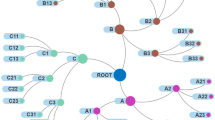Abstract
I present empirical findings from an observational study of female municipal middle managers who are home help assistants in elder care. The observations showed that the home help assistants' sphere of activity was influenced by two distinct patterns: the official line organization and the invisible horizontal social network. I first give a brief description to the immediate background of the present study. Then I describe the line organization and give two empirical examples of information exchange where the practical implication of the line organization at different levels is visible. However, the study also revealed another pattern opposed to the line organization, called the horizontal network. I will give an empirical example of an incident that illustrates how the home help assistants use a social network to solve problems and to make judgments. The study showed that these networks are not persistent – they are rebuilt depending upon context. Members of the network can be people both within and outside the municipal organization. Decisions and problem solving are thus conducted in a process of interaction and negotiations with other people. The social networks are not visible in the official organizational description. Still they form the foundation for the home help assistants' work and influence their ideas of how the work should be conducted. Finally I discuss some implications of the line organization and the social network and the possible consequences when introducing new technology, i.e., computers in work. In this case the computers were planned to support the line organization but not the work practice of social networks.
Similar content being viewed by others
References
Bender, B (1991): Pensionärslotteriet — behovsbedömning inom hemservice, FoU-Rapport nr 2. Stockholms Socialförvaltning.
Boalt Boethius, S. and A-L. Stavren-Eriksson (1992): Ledare på mellannivå i vårdinriktade organisationer, IGOR, Arbetsrapport 32. Department of Psychology, Stockholm University.
Eagly, Alice, H. and Blair T. Johnson (1990): Gender and Leadership Style: A Meta-Analysis. Psychological Bulletin, vol. 108, pp. 233–256.
Ekvall, G., M. Frankenhauser, and D. Parr (1994): Leadership Style and Leadership Stress: A Study of Male and Female Managers in Public Dental Health Care, report no 1. Stockholm: Institute for Research on Business and Work Life Issues.
Ely, M. et al. (1993): Kvalitativ forskningsmetodik i praktiken (Doing Qualitative Research: Circles in Circles). Lund: Studentlitteratur.
Engeström, Y. (1987): Learning by Expanding: An Activity-Theoretical Approach to Developmental Research. Helsinki: Orienta-Konsultit Oy.
Engeström; Y. (1991): Developmental Work Research: Reconstructing Expertise Through Expansive Learning. In M.I. Nurminen and G.R.S. Weir (eds.): Human Jobs and Computer Interfaces. North-Holland: Elsevier Science Publishers BV.
Gilligan, C. (1982): In a Different Voice. Cambridge, Mass.: Havard University Press.
Gynnerstedt, K. (1993): Etik i hemtjänst — en studie av förvaltnings-och professionsetik (Ethics in Home Help Service. A Study of Bureaucratic and Professional Ethics). Doctoral Dissertation, Department of Political Science, Lund University.
Johansson, S. and B. Andersson (1989): Kan hemtjänsten och hemsjukvården professionaliseras? Socialmedicinsk Tidskrift, nr 5–6.
Kvande, E. and B. Rasmussen (1990): Nye kvinneliv — kvinner i mens organisasjoner. Oslo: Ad Notam.
Leont'ev, A.N. (1978): Activity, Consciousness and Personality. Englewood Cliffs: Prentice-Hall.
Miller, J.B. (1986): Toward a New Psychology of Women. Aylesbury: Penguin Books.
Sachs, Patricia (1993): Shadows in the Soup: Conceptions of Work and the Nature of Evidence. The Quarterly Newsletter of the Laboratory of Comparative Human Cognition, vol. 15,no. 4.
Schartau, M-B. (1993): The Public Sector Middle Manager: The Puppet who Pulls the Strings? Doctoral dissertation, Department of Political Science, Lund University.
Stalker, G.M. and T. Burns (1961): The Management of Innovation. London: Tavistock Publications.
Stieng, G.H. (1989): Mellomlederen, Administrator eller kollega? Trondheim: Norsk voksenpedagogisk forskningsinstitut.
Strauss, A. and J. Corbin (1990): Basics of Qualitative Research — Grounded Theory Procedures and Techniques. Newborn Park: Sage Publications.
Sundström, G. and B. Malmberg (1996): The Long Arm of the Welfare State Shortened — Home Help in Sweden. Scandinavian Journal of Social Welfare, vol. 5, pp. 69–75.
Trydegård, G-B. (1990): En mångsidig styrka, Utredningsrapport nr 1. Vårdhögskolan, Örebro Läns Landsting.
Vygotsky, L.S. (1978): Mind in Society: The Development of Higher Psychological Functions. Cambridge: Havard University Press.
Wagner, I. (1993): Women's Voice: The Case of Nursing Information Systems. AI & Society, vol. 4,no. 7, pp, 295–310.
Westerberg, K. and K. Armelius (1996): Municipal middle Managers: Psychosocial Work Environment in Gender Based Division of Labor, DAPS report no 68. Department of Applied Psychology, Umeå University.
Westerberg, K. (1997): Relations as Disturbance and Support in the Work Activity of Female Managers in Elder Care (Unpublished paper).
Author information
Authors and Affiliations
Rights and permissions
About this article
Cite this article
Westerberg, K. Collaborative Networks Among Female Middle Managers in a Hierarchical Organization. Computer Supported Cooperative Work (CSCW) 8, 95–114 (1999). https://doi.org/10.1023/A:1008659328558
Issue Date:
DOI: https://doi.org/10.1023/A:1008659328558




